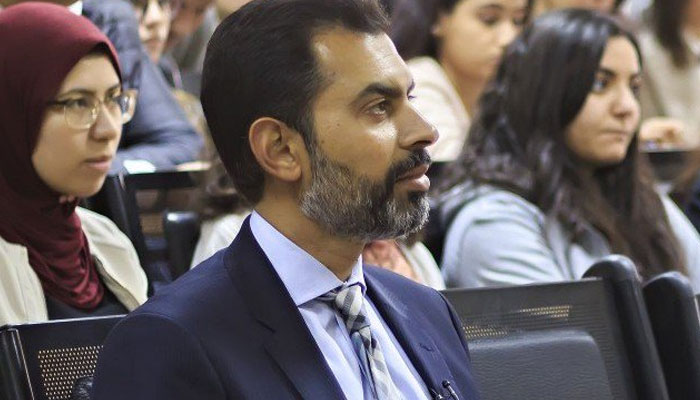Heavy reliance on cash impedes economic documentation goal: SBP
KARACHI: State Bank of Pakistan (SBP) Governor Reza Baqir on Saturday underscored the need of cashless society to improve economic efficiency and documentation, saying the central bank’s objective is to build a robust digital payment infrastructure in the country.
“Heavy reliance on cash and the limited use of digital channels reduces economic efficiency, hinders financial and economic development and impedes the goal of documenting the economy,” SBP governor said addressing a workshop organised to consult stakeholders on the new ‘National Payment Systems Strategy’.
The SBP organised the workshop titled ‘digital payments reforms’, in collaboration with the World Bank. The objective of the workshop was to share the draft of national payment systems strategy and solicit the input of key stakeholders involved in its implementation.
World Bank Country Director Illango Patchamuthu, Pakistan Telecommunication Authority Chairman Amir Azeem Bajwa, and senior officials from different organisations attended the meeting.
Baqir highlighted the longstanding issues that need attention of all the stakeholders. He emphasised the need for rapid digitisation of payments “in order to realise the full benefits for the economy as cash is still the preferred mode of payments for our routine and day to day activities”.
“To address these issues, he emphasised the importance of building a modern and robust payment system in the country that enables the provision of cost effective and easily available digital financial services to the general public,” a statement quoted him as saying. “This is a key strategic objective of SBP.”
Reza shared SBP’s plans for leading an aggressive adoption and implementation of the national payment systems strategy in the country. “Interoperability is key to achieving faster digitisation goals.”
SBP governor also informed the participants that a new faster payment gateway would be launched next year to facilitate instant transfer of funds. He identified government payments and receipts and merchant payments to be the key elements in accelerating digitisation of payments in the country.
“He noted the need for reducing the high cost, especially the interchange fee in the payments industry and emphasised to all stakeholders to work collaboratively for increasing digital access points in the country.”
The SBP’s latest data showed that there were 15,549 bank branches reported by the banks/micro finance banks as on quarter-end January-March 2019. Of which, 114 are overseas branches. All branches, except 27, are providing online banking services to their customers. There are 14,575 automated teller machines (ATMs) and 55,240 point-of-sale (POS) machines in the country. Besides, banks are also providing internet, mobile and call center banking facilities to their customers.
During the quarter under review, e-banking channels – real-time online branches (RTOBs), ATM, POS, mobile phone, internet and call centers banking as well as e-commerce altogether – processed 217.7 million transactions of value Rs14.8 trillion. In the total e-banking transactions, RTOBs had the highest share (84.2 percent) in value of transactions whereas, the highest share with respect to the volume i.e. (59.9) went to transactions processed by ATMs.
The SBP’s data further showed that Pakistan Real time Interbank Settlement Mechanism (Prism) had 45 direct participants, which included commercial banks, microfinance banks, development finance institutions and Central Depository Company during the quarter under review. Prism processed 599,000 transactions of value Rs107.1 trillion. These transactions showed a quarterly decline of 10.3 percent, however showed an increase of 8.9 percent in terms of value.
-
 Meghan Markle Showcases Princess Lilibet Face On Valentine’s Day
Meghan Markle Showcases Princess Lilibet Face On Valentine’s Day -
 Harry Styles Opens Up About Isolation After One Direction Split
Harry Styles Opens Up About Isolation After One Direction Split -
 Shamed Andrew Was ‘face To Face’ With Epstein Files, Mocked For Lying
Shamed Andrew Was ‘face To Face’ With Epstein Files, Mocked For Lying -
 Kanye West Projected To Explode Music Charts With 'Bully' After He Apologized Over Antisemitism
Kanye West Projected To Explode Music Charts With 'Bully' After He Apologized Over Antisemitism -
 Leighton Meester Reflects On How Valentine’s Day Feels Like Now
Leighton Meester Reflects On How Valentine’s Day Feels Like Now -
 Sarah Ferguson ‘won’t Let Go Without A Fight’ After Royal Exile
Sarah Ferguson ‘won’t Let Go Without A Fight’ After Royal Exile -
 Adam Sandler Makes Brutal Confession: 'I Do Not Love Comedy First'
Adam Sandler Makes Brutal Confession: 'I Do Not Love Comedy First' -
 'Harry Potter' Star Rupert Grint Shares Where He Stands Politically
'Harry Potter' Star Rupert Grint Shares Where He Stands Politically -
 Drama Outside Nancy Guthrie's Home Unfolds Described As 'circus'
Drama Outside Nancy Guthrie's Home Unfolds Described As 'circus' -
 Marco Rubio Sends Message Of Unity To Europe
Marco Rubio Sends Message Of Unity To Europe -
 Savannah's Interview With Epstein Victim, Who Sued UK's Andrew, Surfaces Amid Guthrie Abduction
Savannah's Interview With Epstein Victim, Who Sued UK's Andrew, Surfaces Amid Guthrie Abduction -
 Piers Morgan Supports Bad Bunny As US Lawmakers Seek Action
Piers Morgan Supports Bad Bunny As US Lawmakers Seek Action -
 Jennifer Love Hewitt Reminisces About Workign With Betty White
Jennifer Love Hewitt Reminisces About Workign With Betty White -
 Hilarie Burton Reveals Valentine's Day Plans With Jeffrey Dean Morgan
Hilarie Burton Reveals Valentine's Day Plans With Jeffrey Dean Morgan -
 Cardi B Compares Her Fall To Government At Las Vegas Show
Cardi B Compares Her Fall To Government At Las Vegas Show -
 Harry Styles Silently Deleted Instagram App
Harry Styles Silently Deleted Instagram App




